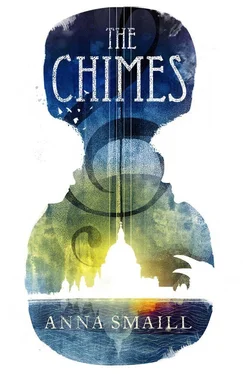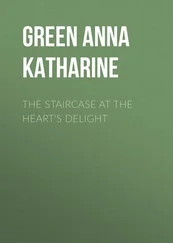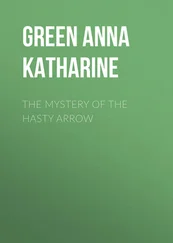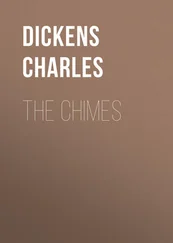The broken piece was her memory of joining the pact. And she must have given it to me. When? And I saw it and I don’t have time or desire to wonder at this right now.
I look close at the cut at the top of my arm. It is still painful.
‘It’s time,’ she said when we were standing on the strand. How many days ago now? And she showed me how she measured it. I will find her a better way, I think.
‘It’s time, Simon,’ says Lucien. He stands at the door of the open-roofed hut, in the sun.

The narrowboats in the canal mooring are shiny blacks and reds and greens, with polished brass and bright curtains. Along the wharf, people have risen into the morning. There are families sitting on the roofs of boats drinking tea from mugs. A few men paint and caulk the boats that stand on the jetty. A young couple leave their boat with tense strides and stand by a bench only a few feet away and begin to argue as if now they have left their home, they are all alone and no one is listening. Everybody around them is listening.
The narrowboat Lucien walks us to is at the farthest end of the mooring pool. The water round it is oily and grey, and the boat looks abandoned. It isn’t polished to the high shine of the others — it’s painted a thick black colour that is dusty and doesn’t reflect the light. There are brass handles and portholes, but they are also dulled and dusty. The curtains are drawn at the portholes. The only thing that marks it as lived in is a teeming garden of pots that grows on the roof. Pots tiny and large, mettle and clay and para. In them are herbs and flowers, bushy shrubs and plants with small leaves like stones.
‘Are you sure this is the right place?’ I ask. Lucien hushes me with a hand gesture and knocks a trick rhythm onto one of the cabin portholes. Inside, the curtain pulls back a few inches. I see a quick glimpse of green eyes and sandy eyebrows before it twitches into place. There is movement inside, and after a few beats a man’s head emerges from the cabin door and he’s on the deck, pulling on a T-shirt.
He’s older than us, a square and practical build, with quick fingers, a plain, energetic face and long hair tied back. The T-shirt has old code on it, and a picture of a skull with a lightning flash across it — an odd relic. His movements are precise as he jumps the short way to the path to stand in front of Lucien.
There is no exchange except the wad of tokens that the man sticks presto into the back pocket of his lean, faded jeans.
‘So, you boys want a ride on the Lily Bolero , I hear?’ he says, and for the first time smiles, which shifts his face from plain and square to handsomeness in a flash. ‘I’m Callum.’
The boat’s name is also that of a familiar jig, and as soon as I hear it, I know I won’t be able to shake the music free. I sing the nonsense words under my breath in a bid to clear them. ‘ Lero Lero, Lily Bolero. Lily Bolero Lullen a Ba .’
Callum looks into the cabin window again, waves inside. ‘Hey, Jemima! We have guests. Come and show them around.’
Another face emerges from the cabin. It’s a girl a bit older than us. She stands on the deck to survey us with a look of confident appraisal. She’s not very tall, and she’s wearing a pair of jeans that are cut off and frayed above the knee, a sloppy blue shirt, a heavy pair of lace-up boots and a man’s green anorak, far too big. Her hair is dark brown and as long as the man’s, and I wonder if he is her father, but I have a feeling he isn’t.
‘Hello,’ she says, and her voice is different. Low and like there’s something in her mouth. Then she signs in solfege to Callum. She doesn’t sing, but her hands move so quick I miss half of it. Something about us, about pacts and pactrunners and how they’re not to be trusted.
I break in, ‘That’s not true.’
Callum turns to me and Jemima breaks off, turns round also and sees my indignant face. She begins to laugh.
‘She’s only joking,’ Callum says. And he signs it at the same time, which I find strange. Why use solfege as well as speech for something like that? Jemima is still laughing, a sound of pure humour. The joke is clearly at our expense, but it is so surprising to hear laughter that I cannot help but laugh also. I think I had forgotten what it sounded like.
‘You’ve been misled about pactrunners,’ I tell the girl. ‘The guilds are always badmouthing us, but they need our trade as much as the Order does.’ Something in me wants her to laugh again, to approve of us.
‘She can’t hear you,’ Callum says.
I stop laughing.
‘She’s deaf,’ he says.
Without thinking I look straight at Lucien. His face is as blank as mine and even paler than usual.
‘I didn’t know,’ I say. ‘I didn’t know that was possible.’
‘She lost her hearing when she was young,’ Callum says, sharp.
I struggle to imagine it. What could it be like? Like living in a closed room for one’s life. Cut off from joy and beauty and meaning.
But Jemima does not look despairing or trapped. Then I think of the Carillon and I wonder if she is able to keep her memories. Is deafness an escape? Perhaps the closed room of her mind is actually full of strange and complex pictures and objects. Perhaps the memories in her head are able to form a line that moves along those walls from start to finish. I look at Jemima and my pity disappears.
I expected the inside of the boat to be all dust and disrepair, but what Jemima shows us is a narrow galley and a scrubbed kitchen table, bolted to the floor. Everywhere things are hanging — lanterns, small sacks of sugar and flour and coffee, knotted ropes of onions and garlic. Small copper pots sway above the large sterno, its gas cylinder lashed firm to a roof beam. The floor of the other half of the cabin is covered in a thick, rich rug with shapes in gold and black and red. There is a curtain and behind it two beds are fitted to the rounded sides of the boat, neat roughcloth covers over them. Beyond that a wooden slatted double door, very low.
‘That’s our room,’ says Jemima. ‘You two are sleeping here.’ She points to the bunks. She signs in solfege, slow so we can hear it. ‘It’s nice to have some company.’
‘We will leave after Chimes,’ Callum says. ‘And travel at night. You two want to move tacet,’ he says. ‘We can do that. We also like to remain muted, sotto voce .’ He signs to Jemima, who laughs again and nods.
‘It’s all quiet on the towpath now. No poliss. No sign of the Order. Narrowboaters have a good chain of call and response. Any movement and we’ll hear it.’ He signs to Jemima, speaking aloud too for my benefit. ‘Why don’t you take Simon for supplies, get some air. There are still a few tolls before Vespers.’
Jemima fetches two parabuckets and a large flat sack that she secures by straps to her back. I try to help her, but she shrugs me off and gestures me to follow. I look back to Lucien, but he has already disappeared behind the curtain into our new quarters.
It is strange to be walking beside somebody new, somebody not of the pact. Somebody whose bodymemory doesn’t share the confines of the tunnels and the vagaries of the map. Jemima, I notice, wastes movements. She turns often from side to side, looking all around her. She stops often to inspect things I would have thought hardly worth notice — a branch that has fallen across the concrete path, a pattern of leaves scattered, a cloud that moves lento overhead. I’m so used to the steady pace of Clare’s run and the silent measure of our shared task that I find several times I’ve outstripped Jemima and run ahead. Each time I expect an angry response. I see Clare with her quick kindle and her eyes sparking at me, but Jemima just smiles to herself as if she is looking at those pictures on the walls of her inward house. And each time I return like an overeager dog and take up her pace again.
Читать дальше



![Чарльз Диккенс - Колокола [The Chimes]](/books/395589/charlz-dikkens-kolokola-the-chimes-thumb.webp)









